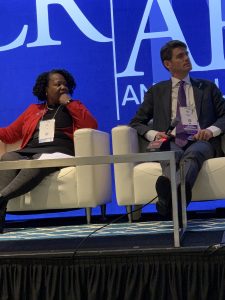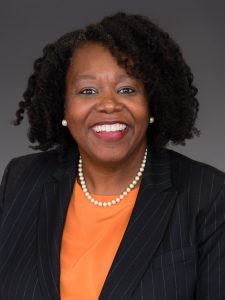ATLANTA—Your voice matters: That was the shared theme of presentations by Angus Worthing, MD, FACR, FACP, William F. Harvey, MD, MSc, FACR, and Georgia Rep. Kim Schofield (D-Atlanta, Dist. 60) in the session, Raise Your Voice! Advocacy Update from Government Affairs, at the 2019 ACR/ARP Annual Meeting on Monday, Nov. 11.
Dr. Worthing, a practicing rheumatologist at Arthritis & Rheumatism Associates in the Washington, D.C., area, talked about making his voice matter in the representation of rheumatology in a meeting with officials at the Department of Health and Human Services while discussing the plan announced by the Centers for Medicare & Medicaid Services (CMS) in August 2018 to permit Medicare Advantage plans to use step therapy for Part B drugs, with a look-back period of just 108 days to be exempt from step therapy.
Dr. Worthing was able to tell the officials in person that many of the drugs he prescribes are administered only every six months or annually, missing the 108-day window. That one meeting helped make a difference in the final rule, which changed the look-back period to 365 days. One voice made a difference.
Having a loud voice helps make a difference. Dr. Worthing also told attendees that Congress has a lot of pressing issues taking attention away from the issues important to rheumatologists and their patients, stressing the importance of continued advocacy to ensure important issues—such as prior authorization, step therapy, musculoskeletal (MSK) ultrasound, the rheumatology workforce shortage, research funding, drug prices, patient access to specialty drugs and infusions, and more remain at the forefront of lawmakers’ minds.
“We dream big,” said Dr. Worthing, reflecting on the fact that just 6,000 rheumatologists among more than a million U.S. doctors can have an impact on U.S. policy. Coalitions, grassroots emails, opinion pieces and other articles in newspapers, the ACR’s Capitol Hill fly-ins, membership in the American Medical Association and RheumPAC are all ways that ACR members have to amplify their voices and ensure rheumatology needs are recognized and acted on in Congress and state halls. “These take our issues up a level,” he says.
To demonstrate this, Dr. Worthing cited several wins the ACR has seen result from advocacy efforts this past year, including the reversal of evaluation and management (E/M) code cuts, MSK ultrasound reimbursement cuts dampened in Medicare and the U.S. Food & Drug Administration decision to require at least three switches in the pathway for biosimilar drug interchangeability approval.
The Fight Must Continue
The E/M code win loomed large in the talk by William F. Harvey, MD, MSc, FACR, a practicing rheumatologist and clinical director of the Arthritis Treatment Center at Tufts University Medical Center, Boston. He said, “the food fight is already beginning. Surgeons and other specialists want the money back. This can be taken away from us. We need to continue the fight.
“If you ever feel like you’re just one person trying to change something, I promise, there are hundreds, thousands, if not millions of people out there who feel the same way as you, who want you to make a difference.”
Dr. Harvey echoed Dr. Worthing’s statements on the impact rheumatology advocacy can make, saying “The ACR really punches above our weight.”
From a Lupus Diagnosis to the State House
Rep. Schofield is a living example of one voice making a difference. She said that her family was always involved in church. They were always involved in community. They were always involved in improving the lives of others. Those are the values instilled in her while she was growing up. A single mother living a middle-class life, she was diagnosed with lupus in 2000.
Now in her 20th year of living with lupus, Rep. Schofield said her saga began with a visit to the optometrist because she thought she had pink eye. He asked, “When was your last physical?”
She replied, “Black people only go to the doctor when they’re sick. I’m not sick.” Three months later, she was finally diagnosed with systemic lupus erythematosus. “Am I going to die? Why me? What about my daughter?” and “No one in my family has had lupus” were among her initial reactions.
“I lived the American dream,” said Rep. Schofield, “and then I got sick.”
The wake-up call that she needed to get her lupus under control came one day when she fell asleep at the wheel of her car during her three-hour commute. Her doctor recommended a leave of absence from her job so she could focus on her health. While she was on leave, her boss called: “We’re going to let you go, because you don’t look sick.”
That’s not the only job she lost because she didn’t look sick. Eventually, she lost her house—and not just one house. This single mother was fighting perception and a system that didn’t allow her to get the care she needed.
Feeling alone, she wrote and sent her story to a local newspaper to connect with others living with lupus. At their first meeting, 65 people showed up. They formed a support group called Lupus and Empowering Community Support (LACES). Then she reached out to the Georgia Chapter of the Lupus Foundation. But she didn’t stop there.
She decided to make some noise. She called her representative in the Georgia General Assembly: “Hi, I’m Kim Schofield, and I have lupus.” No response. She visited her representative: “Hi, I’m Kim Schofield. I called yesterday, and I still have lupus.” Her activism put lupus into the public eye. Georgia’s lawmakers started to pay attention and passed some laws to help. “It wasn’t moving fast enough for me,” she said.
She found a new career working at Emory University with the Georgia Lupus Registry. In 2012, she was appointed under the Obama administration to the Federal Health IT Committee, making health recommendations and Rules to Congress.
In 2017, she was elected to the Georgia General Assembly as a representative to the state House of Representatives. In her first session, she was able to secure appropriations for lupus research and initiatives.
Speaking from her personal experience, Rep. Schofield said, “One person can make a difference. Don’t walk out of here and do nothing when people are counting on you.”
Her work continues. As all three speakers said, you can make a difference, too. Visit the ACR’s Legislative Action Center to send a pre-written email to Congress. Invest in RheumPAC, the nonpartisan political action committee established by the ACR to help elect and support pro-rheumatology candidates. Join the effort, and help magnify rheumatology’s message.
A medical editor and writer based in San Jose, Calif., Keri Losavio has been the editor of The Rheumatologist since 2014.







